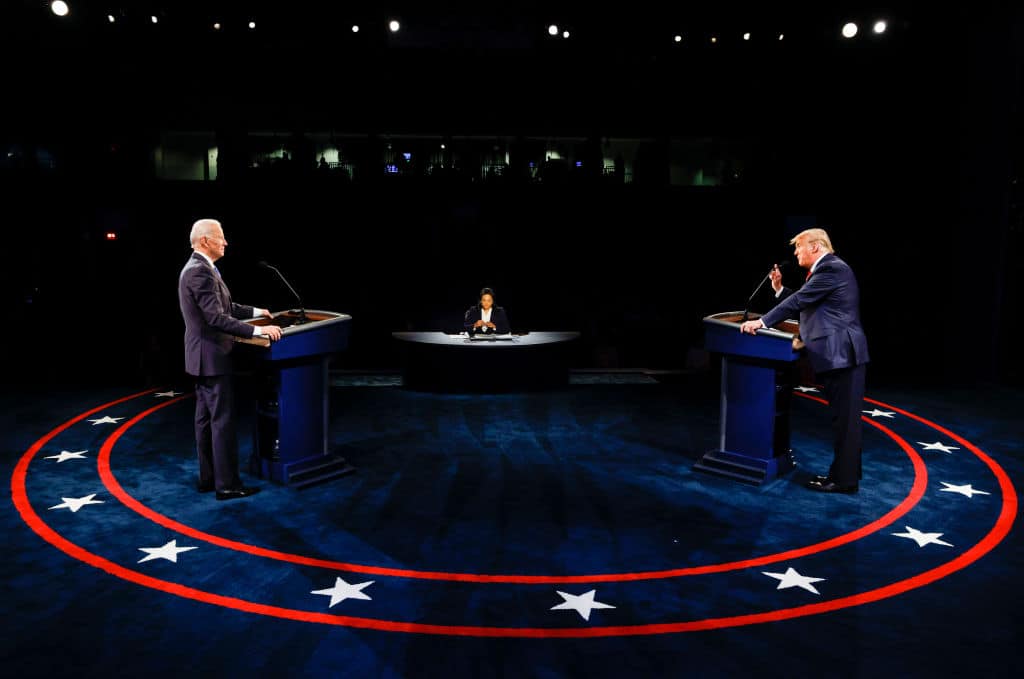The question on everyone’s lips today is who will win the US election and be the next President of the United States (POTUS) – Democrat Joe Biden or Republican Donald Trump?
As an Australian, you might be thinking that it does not really have an effect on you and, while it may not directly, let me assure you that it does.
So, first let’s take a look at the leading candidates and their parties.
Donald Trump’s Rebublican Party is the conservative party within the USA.
In recent years, it has stood for gun rights and lower taxes. Support for this party tends to be stronger in rural areas.
The Democratic Party is the progressive party and, in recent years, it has stood for things like health care and climate change.
Support for Biden’s party tends to be found in more urban areas.
Biden and President Trump have radically different opinions when it comes to policy.
The pair clash on issues like climate change, coronavirus, the economy, healthcare, guns, and more.
For example: President Trump is a climate sceptic. Moving forward, he has no plans to protect the environment and wants to invest more in fossil fuels.
By contrast, Biden believes in climate change and has plans to protect the environment.
He proposes placing a ban on new leases for oil and gas drilling on public land and aims for the USA to reach net zero emissions over the next 30 years.
When it comes to the economy, both parties have their country in mind.
President Trump has pledged to create 10 million more jobs nationally, while Biden wants to raise taxes for high earners.
Now, let’s break down the election process.
University of Newcastle Political Scientist, Professor Jim Jose, says the winner of the US election is decided by the Electoral College.
“The election of the President is done by what are called electors,” he says.
“These are elected members of the House of Representatives and the Senate.
“When people go to the polls today and they are voting, they are simply indicating their preferred candidate and the people they elect go to the Electoral College, where they decide where to send their votes.
“The tradition is that the members [of the Electoral College] will send their votes to the candidate who has the majority in the state.
“For example, Delaware has four electors, two reps and two senators – all four of those will traditionally pass over their votes to the candidate who has the most support in their state.
“It’s a two-step process. It’s the Electoral College made up of the reps and senate and they vote accordingly to the outcome of the public votes in their state.”
Professor Jose adds that there have been some cases where the Electoral College breaks the tradition and goes against the public vote.
When it comes to Australia, he believes that, in the short term, Australia has nothing to worry about but there are longer-term implications.
“Whoever is the incumbent shapes the way US policy operates and shapes the way the US is standing and interacts with the world,” he says.
In Professor Jose’s opinion, it is a bit hard to tell who will be elected at this stage.
“It’s a million-dollar question,” he says.
“I think it pretty clear that Biden will win the popular vote, but it is very unclear about how that will translate with the Electoral College.
“Florida and Pennsylvania are vital. If Biden wins Florida, it will make it much harder for Trump to keep the swing states.
“If Trump wins Florida then Pennsylvania will be the big test, followed by possibly Wisconsin, Michigan and Texas.
“The Electoral College is harder to call, but, if the polls are accurate, they have had Trump behind in five of the seven key swing states.
“Short answer: Biden wins the popular vote and is a strong chance to win the Electoral College but it unclear if he will be able to clear the day.”
Written by Newstate Media journalist Elizabeth Symington.



